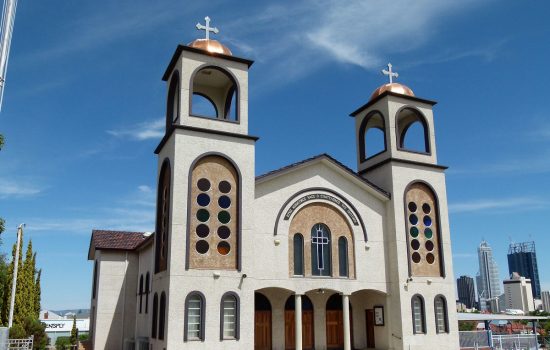Years ago when I was a young boy I was bewildered by the strange school environment that I found myself in. There could not have been a greater contrasting difference between my family’s migrant Greek speaking home and my school. Among many of the strange things that I had to contend with was the English language as we spoke only Greek at home. One of the many words that left me perplexed was the word “Eucharist” which I dismissed as a word not related to my Orthodox faith which I would hear on occasion during religion classes.
Years later when I began to understand my own Orthodox Christian faith better I re-discovered that strange word again – “Eucharist,” – to my pleasant surprise it was the everyday Greek word for “Thank you” or “thanksgiving” – Ἑυχαριστῶ, pronounced – Efharisto.
What a discovery that was for me. This strange word was in fact very familiar to me. So the two words in Greek “Theia Efharistia” means Divine Thanksgiving or – “Holy Communion”.
And what is Holy Communion? It is the very Body and Blood of Christ Himself offered for us sinners. All this is made possible by Christ’s suffering and death on the Cross. This is not offered to us symbolically but it is His actual Body and Blood that we receive. For Christ said “Take eat this is My Body… this is My Blood.” (Matthew 26 vs 26-28)
In other words all of Him for us, so that He may dwell in us, that we might have life in Him, because of the great Love that He has for us. He gives His life for us.
And why would He give all of Himself for us? Because without Him we have no life in us. He is the life in us. Preparing ourselves to receive Holy Communion opens the way for Christ to live in us and we in Him.
“Most Assuredly I say to you” said Jesus “unless you eat the flesh of the Son of Man and drink His blood, you have no life in you.” (John 6 vs. 53)
To return to a state of grace then, we must be healed by partaking in the Sacraments of the Church and to actually receive Christ in us, we must receive Holy Communion which is His Body and His Blood.
To receive Christ is not about making declarations about one’s faith. It is easy for us to make declarations and deceive ourselves about what is our spiritual state and who we are before God. To receive Christ requires us to participate in the Holy Sacraments. We receive Holy Communion by the hand of the Ordained Priest. We receive Holy Communion because we have been Baptised and Chrismated. We receive Him because we have a Spiritual Father to whom we Confess.
We receive Christ who is God and whose life is inexhaustible. He replaces our mortality with life everlasting.
How do we prepare for Holy Communion? We do this first and foremost by our love for God and by keeping His commandments. We do this by seeing ourselves as we really are. By this we mean we see our shortcomings and failings and to do something about them through Confession. Confession assists us in our spiritual healing as do all the Sacraments of the Church. We should also without fail attend Church every Sunday, unless there is some significant problem that prevents us from doing so. We do this to give thanks to God for all He has done for us, for bringing us into existence and inviting us to join Him in eternity for which we were created in the first place.
The healing power of the Sacraments bring us closer to God though we ourselves are not worthy to receive Him. Though we may come to terms with our transgressions we should never fall into despair. There is a fine line between the two – meaning repentance and despair. But there is a very profound difference between the two. Repentance is our continual life struggle to correct and perfect ourselves placing all our hope in God, so that with the help of God we move closer and closer to Him. Despair on the other hand is to know our transgressions but to give up our hope in God. In this state we no longer recognise the active power of God in us to heal us through the Sacraments of the Church and this is a great sin in itself.
Repentance therefore is to know our failings but never to give up on the need to continually strive for our salvation which was won for us by Christ Himself. So we strive to correct ourselves and Christ sees our struggle and delivers us from the enemy and from the darkness.
This is why the fathers of the Church emphasize, “Keep your mind in hell but do not despair.” (St Silouan the Athonite by Archimandrite Sophrony pp. 208)
This means – “Know yourself, knowing that without God you are beyond help, but trust in God that He can and will save you.”
Understanding this will rid us of all pride, all sense of personal achievement and importance and all sense of purpose other than for our salvation and the salvation of all people. Understanding this means that we put God first and our love for Him is before our love for anything else. After all, He gave us everything so it is right and proper that we put Him first to give thanks to Him for the very life He has gifted us.
This realisation can only be put into effect by our willing cooperation with the Divine Will and partaking of the Holy Sacraments of the Church.
The Bridegroom Christ therefore, gives Himself up for each and everyone of us. Christ is the Bridegroom and the soul of each and everyone of us is the Bride. Here we have the whole Church and the meaning of our mystical union with Christ. For “Christ is the Head of the Church” and we are members of His Body (Ephesians 5 vs 23). This is the meaning of eternal mystical marriage. Christ unites Himself with His creation to secure it, to bless it, to deliver it, to bless us and to save His inheritance.
Prayer and fasting is essential in our preparation to receive Holy Communion.
Let us also give thanks to the Lord through our prayer and our fasting.
Thank You God for forgiving us, for sanctifying us, for adopting us and giving Your life for us, so that we may take a share of You, so that we may be united to You, that we might live forever.
Thank you Lord!
Fr Emmanuel Stamatiou


















